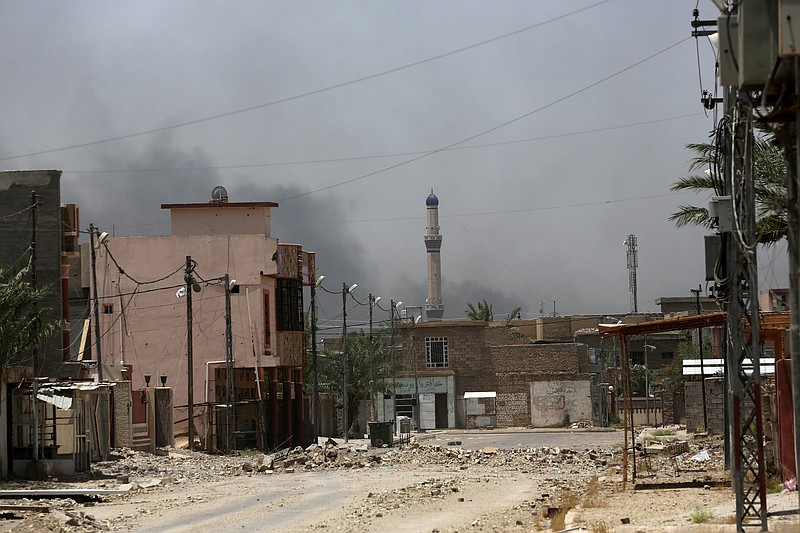FALLUJAH, Iraq (AP) - Dozens of homes were looted and burned as Fallujah was liberated from the Islamic State group, and Iraqi government forces Monday accused the retreating militants. Some provincial police, however, blamed the fires on Shiite militias operating with the federal police.
The allegations of sectarian incidents in Fallujah are on a much smaller scale than those that unfolded in another Sunni-majority city, Tikrit, after government-sanctioned Shiite militias helped retake it from the IS group. The Iraqi government had sought to try to prevent similar abuses in the Fallujah campaign.
Iraqi forces declared Sunday they had "fully liberated" Fallujah from the Sunni-led extremist group that took over the city 40 miles (65 kilometers) west of Baghdad more than two years ago. The operation, backed by airstrikes from a U.S.-led coalition, began May 22, and involved a number of different Iraqi security forces: elite special operations troops, federal police, Anbar provincial police, and an umbrella group of government-approved mostly Shiite militias.
Thick clouds of black smoke billowed over the Julan neighborhood in northwestern Fallujah, one of the last strongholds of the militants, from dozens of burning homes.
Special forces Lt. Gen. Abdul Wahab al-Saadi who led the operation to retake the city, said IS militants had torched hundreds of houses in Fallujah's north and west as they fled Sunday, just as the fighters did in many other neighborhoods in the last five weeks.
But some commanders said many of the fires burning Monday were lit by Shiite militiamen operating with the federal police.
Cpl. Arsan Majid, an Anbar provincial policeman, said he saw men in federal police uniforms looting and burning dozens of homes. An Iraqi special forces soldier, speaking on condition of anonymity because he was not authorized to brief reporters, confirmed Majid's account.
The Shiite militias largely had remained on Fallujah's outskirts during the operation while the special forces and federal police took the lead in clearing the center of the city. Fearing sectarian conflict, authorities did not want the militias inside the city that has long been a stronghold of Sunni opposition to the Shiite-led government in Baghdad.
However, small numbers of militia fighters entered the center of the city with Iraq's federal police forces, according to Iraqi commanders and Associated Press reporters at the scene.
Standing under a highway overpass Monday, a group of Iraqi troops argued over the cause of the smoke.
"It's impossible to know who lit those fires," one man yelled. He pointed down a street of opulent homes used by the militants as bases - all marked with IS graffiti and all completely charred by flames from the inside out.
In one home, melted curtains still hung in the windows and the bright periwinkle paint decorating the sitting room had blistered from the heat.
"Daesh did it, just like they did here," he said, using the Arabic acronym for the Islamic State group.
Majid, of the Anbar police, initially nodded his agreement in front of the group, but later, he whispered to a reporter that Shiite militias operating with the federal police were to blame.
"They destroyed 50 homes in a single day," he said out of earshot of the group of Iraqi army officers.
Special forces Cpl. Mohammad Hussein, stationed at a makeshift base in the city center, said his men arrested a half-dozen people who were caught looting. "They were just taking whatever they could find," he said.
Along the main east-west highway, dozens of minarets still rose above Fallujah's mostly squat homes and buildings. Known as "the city of mosques," almost all are still standing, but many have their intricate tile work chipped away by small arms fire and artillery.
At the Khalifa Mosque beside the central hospital, artillery fire punched a hole below one of its blue domes.
On the side of the road, a group of federal police gathered to slaughter a dozen sheep in celebration of Sunday's victory.
Standing above a pile of sheep carcasses, police officer Arkan Saker shrugged off allegations his forces were to blame for the fires burning on the far edge of the city.
"It's just people burning garbage," he said, "or it could be from a house booby- trapped with explosives."
The overall damage to Fallujah appears to be much lower than in Ramadi and Sinjar. In those areas, entire blocks were left largely uninhabitable by intense Iraqi and coalition airstrikes to clear territory and hundreds of planted bombs.
The U.N. estimates 85,000 people have fled Fallujah in the past month, and many are sheltering in hot, overcrowded camps in the middle of the desert as the Iraqi government is ill-prepared to deal with the humanitarian crisis.
U.S. State Department spokeswoman Elizabeth Trudeau said Washington "remained concerned about the humanitarian situation for Iraqis fleeing the fighting."
"However, we have seen significant progress by the U.N. and Iraqis in recent days to provide for the basic necessities of internally displaced persons," she said.
Majid, the policeman who also fought in Ramadi, said Fallujah was left in better shape, but acknowledged that the damage was still significant.
"Even this destruction could change how people feel about the government," he said.
"Imagine the people who will return here just to find their home burned," Majid added. "They will have to go back to the camps. It's terrible."
___
Associated Press writer Matthew Lee in Washington contributed.
